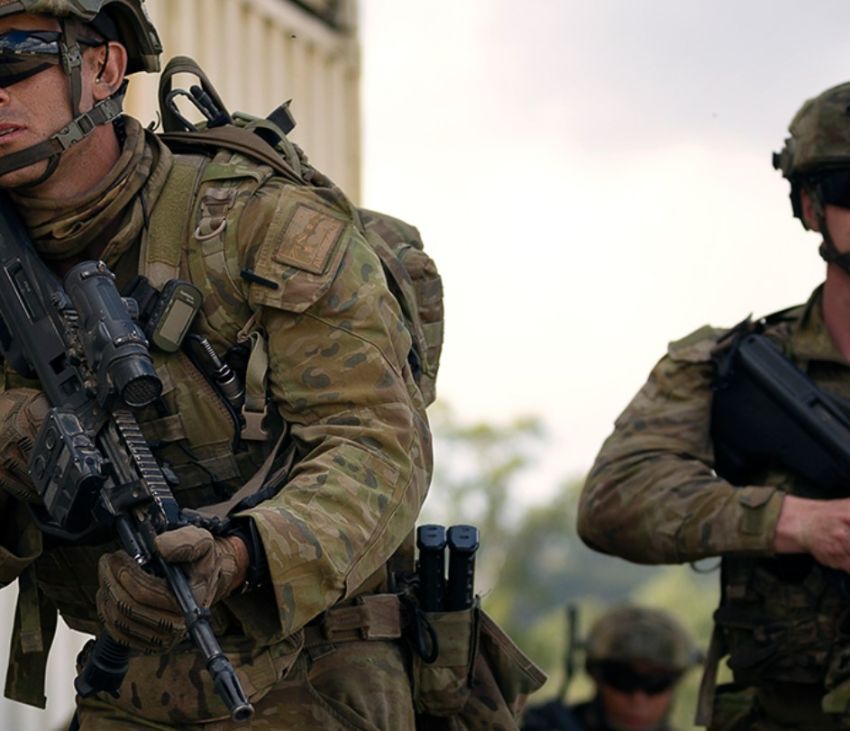
Every year about 30–60 of Australia’s most elite soldiers participate in the “Conduct After Capture” course. It is meant to train soldiers to resist certain exploitation and interrogation techniques that an enemy force may use, in the unlikely scenario that an Australian soldier is captured.
However, what these soldiers really go through is a series of human rights abuses that can traumatise them for the rest of their lives.
The course has been the subject of complaints since 2005, when human rights lawyer Cameron Murphy said that “these people are people who ultimately may have to look after prisoners of war and this is not the example that should be set ... the effect could be that we have soldiers on the frontline who are mentally unstable as a result of government-sanctioned torture”.
His words ring true 18 years later, as Australian soldiers are alleged to have meted out horrific treatment to unarmed captives in Afghanistan.
Unlike any others, the course traumatises soldiers using torture, sexual assault and dehumanisation techniques designed to cause moral injury.
The course is designed to traumatise. The torture techniques, criticised by independent Senator Jacqui Lambie in 2016, closely resemble deep interrogation used by the British against suspected Irish Republican Army members during the Irish troubles in 1971.
The individuals who were subjected to these techniques were known as the hooded men, and they only recently received justice when, in 2021, the British Supreme Court agreed that the five techniques (also known as “deep interrogation”) used against them are torture.
These include: sleep deprivation; hooding; stress positions; subjection to noise and being deprived of food and water. The hooded men fought for 50 years to get the recognition that what happened to them was torture.
I am doing the same for Australian soldiers who have gone through this training and are still going through it today.
The five techniques have been deployed around the world since the European Court of Human Rights ruled in 1978 that while they constituted inhumane and degrading treatment, they did not constitute torture.
Even though the court said “recourse to the five techniques amounted to a practice of inhuman and degrading treatment, which in practice was in breach of [the European Convention on Human Rights]”, it ruled that: “Although the five techniques, as applied in combination, undoubtedly amounted to inhuman and degrading treatment, although their object was the extraction of confessions, the naming of others and/or information and although they were used systematically, they did not occasion suffering of the particular intensity and cruelty implied by the word torture as so understood.”
This led many countries, including the United States, Britain, Israel and now Australia to start using these techniques.
The use of the five techniques led to the death of Iraqi citizen Baha Mousa, who had been detained by the British in Iraq in 2003.
The 2017 Senate inquiry, Operation of the Australian Defence Force’s (ADF) resistance to interrogation (RTI) training, which looked into the course, found that multiple soldiers had developed post-traumatic stress disorder (PTSD) and depression from this training.
One anonymous submission said: “Dealing with the PTSD and depression over 20 years since this [course] has seriously damaged my marriage, family life, career, earning capacity and general health and well-being.
“Had I known what it entailed, I would never have consented to such an activity.”
The then-Coalition government rejected the inquiry’s recommendation that the course be independently assessed for any breaches of human rights.
The Royal Commission into Defence and Veteran Suicide, which is still receiving submissions and is due to report next year, also criticised the Conduct After Capture course. It found that participants were 38 times more likely to commit suicide than the general population, and 15 times more likely than the veteran population.
These suicides are completely avoidable: we have to acknowledge that they will only continue unless we change this course.
We need to fight against it because it is one of the most severe forms of human rights abuses happening in this country. ReformCAC aims to make changes to this course by removing the torture, sexual assaults and other human rights abuses.
It seeks to replace the army psychologists that allow these abuses to happen, with civilian psychologists who do not answer to the army hierarchy.
It seeks to support veterans who went through this course by making all mental health claims de facto accepted by the Department of Veterans Affairs.
It seeks to get the federal government to declare that the five techniques are a form of torture and will not be tolerated.
Finally, it seeks an apology from the government to soldiers and the wider community who have also been affected.
We cannot stand by while people are being subjected to such severe forms of torture, especially if these techniques are learned from this training and applied to innocent civilians in wars overseas.
Soldiers are not allowed to unionise, or call for action themselves. They rely on the wider community to stand up for their rights.
Show solidarity with soldiers and veterans and demand the Minister for Defence Richard Marles, or your local MP, reforms this course.
[Damien de Pyle is a former infantry soldier and the current president of ReformCAC.]